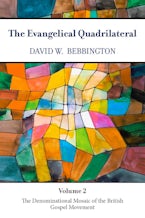David Bebbington is well known for his characterization of the Evangelical movement in terms of the four leading emphases of Bible, cross, conversion, and activism. This quadrilateral was expounded in his classic 1989 book Evangelicalism in Modern Britain: A History from the 1730s to the 1980s. Bebbington developed many of the themes in that book in articles published from the 1980s to the present, but until now most of those articles have remained little known. The present collection of thirty-two essays makes readily available these important explorations of key aspects in the history of Evangelicalism.
The Evangelical movement arose in the eighteenth century in Britain and America as a revitalization of Protestantism. Sharing much with the Puritans who preceded them, the Evangelicals nevertheless adopted a fresh stance by making revival rather than reformation their priority. Coming from diverse denominations, they formed a zealous united front. Over subsequent centuries they grew in number and carried their message throughout the world, giving rise to many of the churches in the global South that have come to the forefront in world Christianity. The essays in this work deal chiefly with Britain, though a few place the British movement in a world setting. Because Evangelicals on both sides of the Atlantic interacted, reading much of the same literature and visiting each other, there was a great deal of common ground between the British and American movements. Hence many of the topics covered here relate to developments mirrored in the American churches over the last three centuries.
The two volumes of The Evangelical Quadrilateral address different aspects of the Evangelical movement. The first volume deals with issues in the movement as a whole, and the second volume examines features of particular denominational bodies within Evangelicalism. Each volume contains an introductory essay reviewing recent literature in the field, and then a series of related essays.
Volume 2, The Denominational Mosaic of the British Gospel Movement, turns to the movement’s component parts. The essays cover such representative areas as the Islington Conference’s influence in setting out the public stance of Anglican Evangelicals, the doctrine and spirituality of the Methodists, the Baptists in Britain in light of Nathan Hatch’s thesis about the democratization of American Christianity, the role of the (so-called Plymouth) Brethren in world Evangelicalism, and the charismatic renewal that transformed church life in the postwar world. This second volume therefore brings out the wide range of denominations in the Evangelical mosaic.

